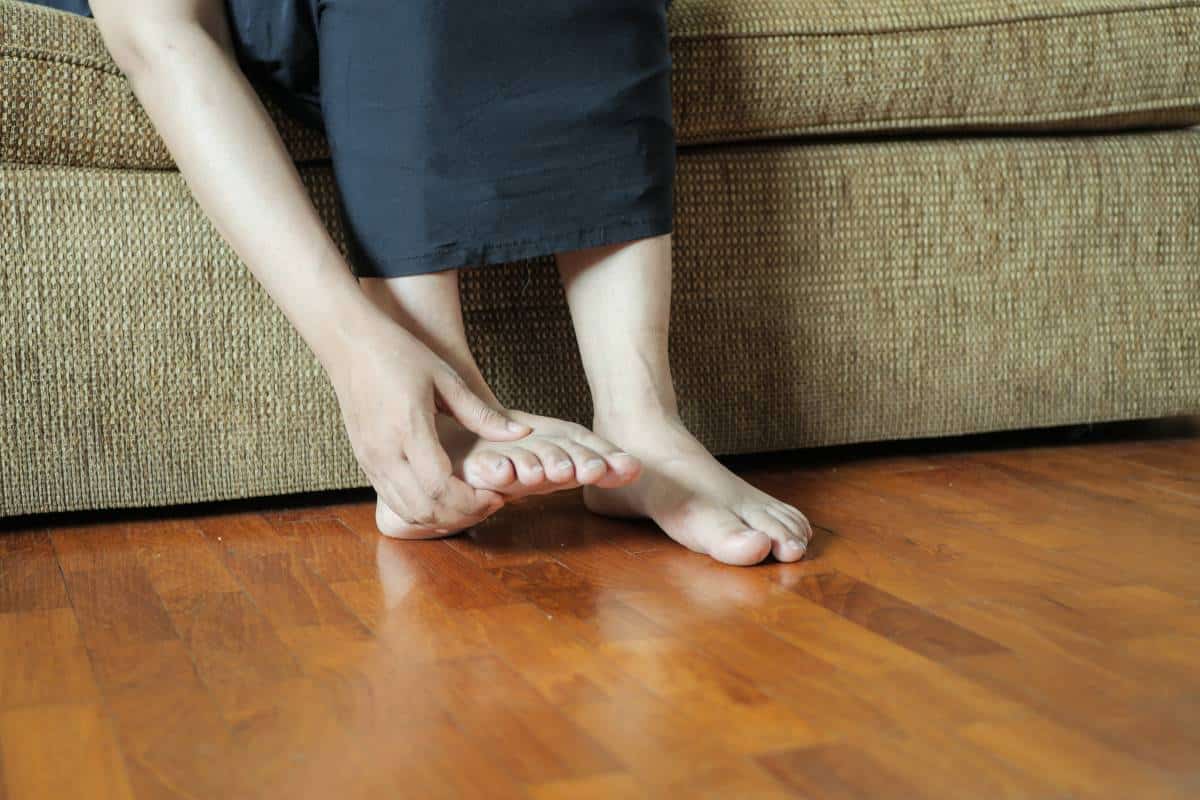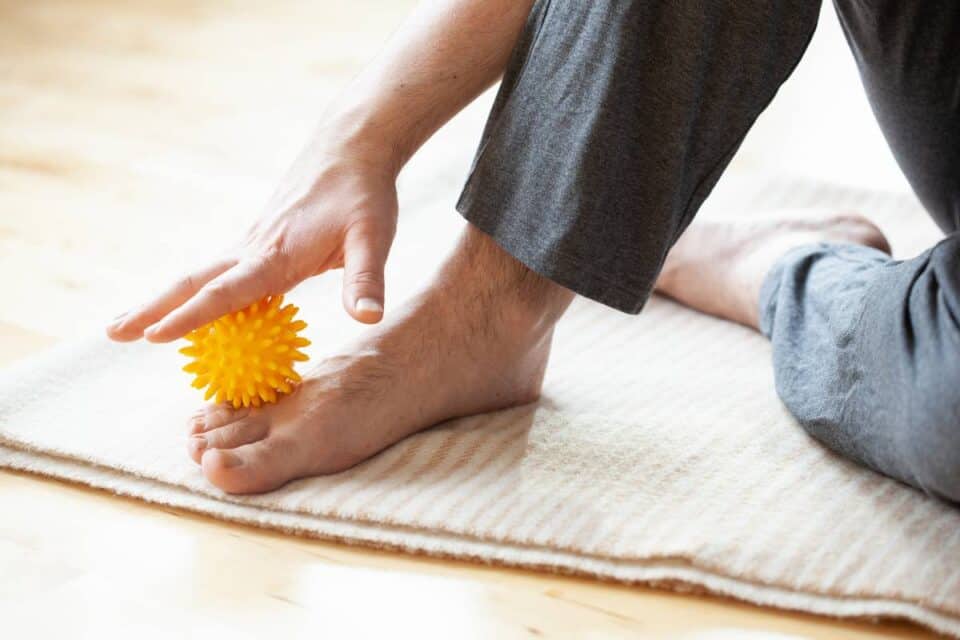If you’re one of the estimated 20 million Americans suffering from peripheral neuropathy1, you know just how debilitating the pain, numbness, and tingling in your feet can be. As a chiropractor with years of experience helping patients manage this condition, I’m here to share some good news. There are plenty of natural remedies that can provide relief and improve your quality of life. This comprehensive guide will explore the most effective at-home treatments for foot neuropathy, from simple lifestyle changes to powerful supplements and complementary therapies. So, let’s dive in and discover how you can take control of your symptoms and get back to enjoying life to the fullest!
Key Takeaways
- Natural remedies such as foot soaks, supplements, and lifestyle changes can effectively manage peripheral neuropathy symptoms, reducing pain and improving quality of life.
- A holistic approach combining home treatments, complementary therapies, and professional care offers the best results for those suffering from foot neuropathy.
- Working with a chiropractor experienced in treating neuropathy can help you develop a personalized treatment plan that addresses your unique needs and goals, empowering you to take control of your symptoms and rediscover a healthy, active life.
Table of Contents
- Understanding Peripheral Neuropathy
- Lifestyle Changes for Managing Foot Neuropathy
- Herbal remedies
- Home Remedies for Foot Neuropathy
- Complementary Therapies
- Foot Care Tips for Neuropathy
- Nutrition and Dietary Considerations
- Mind-Body Connection and Stress Management
- Working with Healthcare Providers
- A Success Story
- Learn More About Neuropathy
- FAQs
- Conclusion
Understanding Peripheral Neuropathy
As a doctor, I want to explain foot neuropathy in simple terms before we talk about natural ways to treat it. Foot neuropathy happens when the nerves in your feet get hurt. This can make your feet feel funny in different ways. You might feel numbness like your foot is asleep. Or you might feel tingling, like pins and needles. Sometimes it can hurt – either a burning feeling or sharp pains. Your feet might also be extra sensitive when touched. Some people’s feet feel weak or they get cramps.
Foot neuropathy can happen for many reasons. The most common cause is diabetes. But it can also happen after cancer treatments, from drinking too much alcohol, from some diseases where the body attacks itself, from infections, or if you hurt your foot badly. Knowing what caused the nerve damage helps us figure out how to treat it best.
Claim Your Free 10-Minute Neuropathy Relief Consultation
Foot neuropathy holding you back? Our expert chiropractors offer a free 10-minute consultation to explore natural relief options. Don’t wait – schedule your complimentary session and take the first step towards pain-free living today.
Lifestyle Changes for Managing Foot Neuropathy
One of the most important aspects of managing foot neuropathy is making healthy lifestyle choices. Here are some key changes that can help alleviate your symptoms:
Maintaining a healthy diet
According to Mayo Clinic2, Eating a balanced, nutrient-rich diet can help support nerve health and reduce inflammation. Focus on incorporating plenty of fruits, vegetables, whole grains, lean proteins, and healthy fats into your meals. Some specific foods that may be beneficial for neuropathy include:
- Berries, which are high in antioxidants
- Fatty fish, which contains omega-3 fatty acids
- Dark, leafy greens, which are rich in vitamins and minerals

Importance of regular exercise
Regular physical activity can help improve circulation3, reduce pain, and maintain muscle strength. Low-impact exercises such as swimming, cycling, or yoga are often well-tolerated by people with neuropathy. Aim for at least 30 minutes of moderate exercise most days of the week.
Managing blood sugar levels for diabetic neuropathy
If your neuropathy is caused by diabetes, keeping your blood sugar levels in check is crucial. Work with your healthcare team to develop a diabetes management plan that includes regular blood sugar monitoring, a healthy diet, and medication if necessary.
Quitting smoking and limiting alcohol consumption
Both smoking and excessive alcohol consumption can worsen neuropathy symptoms4 by damaging nerves and reducing blood flow. If you smoke, quitting is one of the best things you can do for your overall health. If you drink alcohol, do so in moderation.
Practicing good sleep hygiene
Getting enough quality sleep is essential for nerve health and pain management. Establish a regular sleep schedule, create a relaxing bedtime routine, and ensure your sleep environment is comfortable and conducive to rest.
Herbal remedies
Let me tell you about some plants that might help with foot nerve pain. Scientists have been looking into this, and their research shows some interesting things.
According to studies, there are herbs that can reduce swelling in your body, which might help your feet feel better. Some of these you might know from cooking, like cayenne pepper, tarragon, and turmeric. Others you might not have heard of, like black cumin and holy basil. Rosemary and sage, which smell nice in food, might also help.
These herbs can be found in different forms. Sometimes they’re in creams you can put on your skin, or in pills you can take.
Research has also looked at a plant called cannabis. Some people use it for pain. It’s allowed as medicine in many places, but not everywhere. The rules about using it are different depending on where you live.
Before you try any of these plants, it’s really important to talk to me or your regular doctor first. Even though research shows these might help, we need to make sure they won’t cause problems with any medicines you’re taking or other health issues you have. As your doctor, I want to help you find what works best for you, safely, based on what science tells us and what’s right for your body.
Home Remedies for Foot Neuropathy
In addition to lifestyle changes, there are several home remedies that can help alleviate foot neuropathy symptoms. Here are some of the most effective options:
Foot soaks
Soaking your feet in warm water can help improve circulation and reduce pain. Try adding Epsom salt or essential oils like peppermint, chamomile, or ginger for an extra soothing effect. Aim to soak your feet for 15-20 minutes, 3-4 times per week.
Massage and essential oils
Let’s talk about essential oils and how they might help with nerve pain in your feet. These are strong-smelling oils that come from plants. Some people find them helpful, but we still need more research to be sure how well they work.
Studies suggest that some essential oils might be good for your nerves. They could help blood flow better in your body and reduce pain and swelling. Oils that scientists think might help include eucalyptus, lavender, bergamot (which smells like oranges), and nutmeg.
If you want to try these oils, it’s important to use them safely. Don’t put them on your skin without mixing them first. You should mix a few drops of the essential oil with about an ounce of a milder oil, like olive oil. When you put this mix on the sore parts of your feet, it might help with the stinging or tingling feelings.
While some research5 shows these oils might help, the FDA (that’s the government group that checks medicines) doesn’t check essential oils like they do other treatments. So we can’t be completely sure about how pure or strong they are.
It’s always best to discuss any new treatments with your healthcare provider before trying them. This way, we can make sure they’re safe for you and won’t interfere with any other treatments you’re using.
Supplements
Certain vitamins and minerals have been shown to support nerve health and reduce neuropathy symptoms. Some of the most beneficial supplements include:
- B vitamins (B12, B1, B6): These vitamins are essential for nerve function and can help reduce pain and inflammation.
- Alpha-lipoic acid: This powerful antioxidant has been shown to improve nerve function and reduce symptoms of diabetic neuropathy.
- Magnesium: This mineral helps regulate nerve impulses and can help alleviate pain and cramping.
- Omega-3 fatty acids: Found in fish oil supplements, omega-3s have anti-inflammatory properties that can help reduce neuropathy pain.
Topical treatments
Applying topical creams or ointments can provide targeted relief for foot neuropathy symptoms. Some effective options include:
- Capsaicin cream: Made from chili peppers, capsaicin cream can help reduce pain by blocking pain signals.
- Lidocaine patches or creams: These numbing agents can help alleviate pain and discomfort.
Heat therapy
Using heat therapy can help modulate pain and inflammation. Apply a heating pad or warm compress to your feet for 10-15 minutes, followed by some rest for another 10-15 minutes. Repeat this process 2-3 times per day.

Complementary Therapies
Alongside home remedies, several complementary therapies can provide significant relief for foot neuropathy symptoms. Here are some of the most effective options:
Acupuncture
Acupuncture is a traditional Chinese medicine technique that involves inserting thin needles into specific points on the body to stimulate healing and reduce pain. In a pilot study6 involving 47 people with peripheral neuropathy, 76% of participants showed improved symptoms after receiving acupuncture treatment.
Transcutaneous electrical nerve stimulation (TENS)
TENS7 therapy uses low-voltage electrical currents to stimulate nerves and reduce pain. A small, portable TENS unit can be used at home, with electrodes placed on the skin near the affected area. Many people find TENS therapy effective for managing neuropathy pain.
Biofeedback therapy
Biofeedback therapy helps you learn to control involuntary bodily functions, such as heart rate and muscle tension, to reduce pain and stress. During a biofeedback session, sensors are attached to your skin to monitor your body’s responses, while you practice relaxation techniques like deep breathing or visualization.
Yoga, tai chi, and low-impact exercises
Gentle, low-impact exercises like yoga and tai chi can help improve balance, flexibility, and circulation while reducing pain and stress8. These practices also promote mindfulness and relaxation, which can be beneficial for managing chronic pain conditions like neuropathy.
Mindful meditation and guided imagery
Mindfulness practices9, such as meditation and guided imagery, can help you cope with pain and stress by focusing your attention on the present moment and promoting relaxation. These techniques can be practiced at home using apps, videos, or audio guides.
Chiropractic Care with Class IV Laser Therapy and Massage Therapy
Chiropractic adjustments and Massage Therapy can help alleviate neuropathy symptoms by improving spinal alignment, reducing muscle tension, and promoting circulation. But the biggest game changer for our patients with neuropathy is our Class IV Summus Laser Therapy.
This machine has a pre-set protocol where it stimulates nerves with different wavelengths of red light and near-infrared light which causes the nerve tissue to regenerate by increasing oxygen and ATP production.
Patients report less burning and tingling in their feet as well as being able to feel more overall general sensations. As a chiropractor, I often incorporate this modality into my patients’ treatment plans for optimal results.
Foot Care Tips for Neuropathy
Proper foot care is essential for preventing complications and managing symptoms of neuropathy. Here are some key tips to keep in mind:
Choosing the right footwear
Opt for shoes that fit well, provide ample support, and have a wide, comfortable toe box. Avoid shoes with high heels or narrow, pointed toes, as these can put excessive pressure on your feet and exacerbate neuropathy symptoms.
Wearing neuropathy socks
Specialty neuropathy socks can help reduce friction, wick away moisture, and provide gentle compression to improve circulation. Look for socks made from soft, breathable materials like bamboo or merino wool.
Daily foot inspections
With neuropathy, you may not feel injuries or sores on your feet. Make a habit of inspecting your feet daily for any cuts, blisters, or signs of infection. Use a mirror to check the bottoms of your feet, or ask a family member for help if needed.
Proper foot hygiene and nail care
Keep your feet clean and dry, and moisturize regularly to prevent cracking or dryness. Trim your toenails straight across, and file any sharp edges to prevent ingrown nails or injuries.
When to consult a podiatrist
If you notice any persistent sores, infections, or deformities in your feet, consult a podiatrist for professional treatment. They can help address any underlying issues and provide guidance on proper foot care.
Preventing foot injuries and complications
To minimize the risk of foot injuries, always wear shoes or slippers, even when indoors. Be cautious when walking on uneven surfaces, and use assistive devices like a cane or walker if needed for stability. Keep your floors clutter-free to prevent tripping hazards.
Nutrition and Dietary Considerations
What you eat can have a significant impact on your neuropathy symptoms. Here are some dietary tips to help manage foot neuropathy:
Anti-inflammatory diet
Eating foods that fight swelling in your body can help with pain. Try to eat lots of fruits and vegetables, whole grains, lean meats, and healthy fats. Some really good foods for this are fish like salmon and sardines, green leafy vegetables like spinach, colorful fruits like berries and cherries, nuts like walnuts, and seeds like flaxseeds. Some spices can even help, like ginger, turmeric, and cinnamon.
Balancing blood sugar levels
If you have diabetes, keeping your blood sugar steady is really important to protect your nerves. You can do this by choosing foods that don’t make your blood sugar go up and down quickly. Good choices are vegetables that aren’t starchy, whole grains like brown rice and oatmeal, beans, and lean proteins like chicken, fish, or tofu.
Foods to include and avoid
Besides what we’ve already talked about, there are some other foods that might be good for your nerves. Bone broth has things in it that can help your nerves stay healthy. Foods like sauerkraut and kimchi, which have good bacteria, can help your stomach, which is connected to your overall health. Even dark chocolate (the kind with less sugar) has things in it that might help your nerves.
On the other hand, there are some foods you might want to eat less of. Foods with a lot of sugar or white flour can make inflammation worse. Some types of fats, especially those in fried foods, can also be bad for your nerves. It’s also a good idea not to drink too much alcohol. Try to avoid foods with a lot of artificial ingredients – foods that are closer to their natural state are usually better for you.
Meal planning and preparation tips
Let’s talk about how to make eating well easier when you’re dealing with nerve pain in your feet. Planning ahead can really help you stick to foods that make you feel better.
One good idea is to think about what you’ll eat for the whole week. This way, you can make sure you have all the healthy foods you need in your kitchen. It’s like making a roadmap for your meals.
Another helpful trick is to cook big batches of food at once. You can make a lot of a healthy meal and then freeze some of it. This gives you quick, easy meals for busy days when you don’t feel like cooking.
It’s also smart to keep your fridge stocked with lots of colorful fruits and vegetables. These make great snacks and can easily be added to your meals. They’re packed with good things your body needs.
Don’t be afraid to try new recipes, too. Eating the same things all the time can get boring. Looking for new, healthy recipes can make eating well more fun and interesting.
The goal is to make it easy and enjoyable to eat foods that help your nerves. With a little planning, you can make meals that are good for you and taste good too.
Mind-Body Connection and Stress Management
The mind-body connection plays a significant role in managing neuropathy symptoms. Stress, anxiety, and depression can all exacerbate pain and discomfort, creating a vicious cycle that’s difficult to break. Here are some strategies for leveraging the mind-body connection and managing stress:
Impact of stress on neuropathy symptoms
Chronic stress can worsen neuropathy symptoms by increasing inflammation, disrupting sleep10, and altering pain perception. Learning to manage stress effectively is a crucial component of any neuropathy treatment plan. Find out about our Summus Red Light Therapy bed which uses a Mood protocol to enhance your sleep sessions during nights!
Relaxation techniques and deep breathing exercises
Simple relaxation techniques like deep breathing, progressive muscle relaxation, and visualization can help calm the mind and reduce pain11. Practice these techniques regularly, especially when you’re feeling stressed or overwhelmed.
Cognitive-behavioral therapy and counseling
Cognitive-behavioral therapy (CBT)12 is a type of counseling that helps you identify and change negative thought patterns and behaviors that contribute to stress and pain. Working with a mental health professional who specializes in CBT can be incredibly beneficial for managing neuropathy symptoms.
Joining support groups
Connecting with others who understand what you’re going through can provide a sense of validation and empowerment. Look for local or online support groups for people with neuropathy, where you can share experiences, coping strategies, and encouragement.

Working with Healthcare Providers
While natural remedies can be highly effective for managing foot neuropathy, it’s essential to work closely with your healthcare providers for optimal results. Here are some key points to keep in mind:
Importance of discussing natural treatments with doctors
Always inform your doctor about any natural remedies or supplements you’re using, as some may interact with medications or have unintended side effects. Your doctor can help you determine which treatments are safe and appropriate for your specific condition.
When to seek professional help
If your neuropathy symptoms are severe, worsening, or not responding to home treatments, don’t hesitate to seek professional help. A chiropractor can provide additional guidance and interventions to help manage your symptoms.
A Success Story
Here’s Scott C.’s success story:
“I suffered from neuropathy for 17 years, barely able to walk 100 feet. But with determination and help, I gradually increased my walking distance each day. Today, five years after being told I’d be in a wheelchair forever, I walk 4 to 8 miles pain-free, with the legs of a 19-year-old. This past spring and summer, I walked over 200 miles. I wake up every day grateful for the life-changing treatment that gave me back a life worth living.”
To read more inspiring accounts of how chiropractic care has made a real difference in people’s lives, please visit the testimonials page on our website. There you’ll find numerous stories from satisfied patients sharing their experiences with Dr. Mario’s skilled and compassionate care. From resolving chronic pain to improving mobility to boosting overall health, these testimonials demonstrate the wide-ranging benefits that chiropractic treatment can provide.
We encourage you to browse these success stories to learn more about how chiropractic may be able to help you achieve your health goals and enhance your quality of life. If you have any questions or would like to schedule an appointment, please don’t hesitate to contact The BodyFix.
Our friendly staff is here to help!
Learn More About Neuropathy
If you found this information helpful, check out our other articles on neuropathy management and treatment options:
- Neuropathy: Does This Vita Red Light Therapy REALLY Work?
- Class IV Laser Therapy For Diabetic Neuropathy
- How Class IV Laser Helps With Diabetic Neuropathy?
- Diabetic Neuropathy Exercise That You Can Do
Claim Your Free 10-Minute Neuropathy Relief Consultation
Foot neuropathy holding you back? Our expert chiropractors offer a free 10-minute consultation to explore natural relief options. Don’t wait – schedule your complimentary session and take the first step towards pain-free living today.
FAQs
What is the most effective natural treatment for foot neuropathy?
Can dietary changes help alleviate symptoms of peripheral neuropathy?
How often should I soak my feet to relieve neuropathy pain?
Are there any essential oils that can help with nerve pain in feet?
When should I consult a healthcare provider about my foot neuropathy symptoms?
Conclusion
Managing foot neuropathy can be a challenging journey, but there is hope. By incorporating neuropathy natural remedies, lifestyle changes, and complementary therapies into your treatment plan, you can effectively alleviate symptoms and improve your overall well-being. Remember, everyone’s experience with neuropathy is unique, so be patient with yourself, and don’t hesitate to reach out for support when needed.
If you’re ready to take control of your foot neuropathy and explore natural treatment options, I invite you to schedule a consultation with me. As a chiropractor with extensive experience in treating neuropathy, I’m here to help you develop a personalized plan that addresses your specific needs and goals. Together, we can work towards reducing your pain, improving your function, and enhancing your quality of life.
Don’t let neuropathy hold you back any longer – take the first step towards relief today.
- https://www.yalemedicine.org/conditions/neuropathy ↩︎
- https://www.mayoclinic.org/diseases-conditions/peripheral-neuropathy/diagnosis-treatment/drc-20352067#:~:text=Regular+exercise%2C+such+as+walking,Quit+smoking. ↩︎
- https://www.ncbi.nlm.nih.gov/pmc/articles/PMC5461882/ ↩︎
- https://www.ncbi.nlm.nih.gov/pmc/articles/PMC3370340/ ↩︎
- https://www.ncbi.nlm.nih.gov/pmc/articles/PMC9323890/ ↩︎
- https://pubmed.ncbi.nlm.nih.gov/17355547/ ↩︎
- https://www.ncbi.nlm.nih.gov/pmc/articles/PMC4589923/#:~:text=Introduction-,Transcutaneous%20electrical%20nerve%20stimulation%20(TENS)%20is%20a%20non%2Dinvasive,skin%20to%20activate%20underlying%20nerves. ↩︎
- https://www.ptcoa.com/top-10-low-impact-exercises-for-effective-pain-management ↩︎
- https://newsinhealth.nih.gov/2021/06/mindfulness-your-health#:~:text=Studies%20suggest%20that%20focusing%20on,help%20people%20cope%20with%20pain. ↩︎
- https://www.ncbi.nlm.nih.gov/pmc/articles/PMC10392808/ ↩︎
- https://www.ncbi.nlm.nih.gov/pmc/articles/PMC8272667/ ↩︎
- https://www.cognitivetherapynyc.com/stress-management/ ↩︎
- https://www.healthline.com/health/diabetes/essential-oils-for-neuropathy#:~:text=What%20the%20research%20says,benefits%2C%20risks%2C%20and%20efficacy. ↩︎
Blog Disclaimer: The information provided on The BodyFix Chiro blog is for general informational and educational purposes only and is not intended as medical advice. These articles reflect our opinions and experiences but should not be used to diagnose or treat any health conditions. Always consult with your physician, chiropractor, or other qualified healthcare provider before starting any new treatment, exercise program, or making changes to your health routine. Any actions you take based on information from this blog are entirely at your own risk, and The BodyFix Chiro and its contributors disclaim any liability for the decisions you make based on this information.


